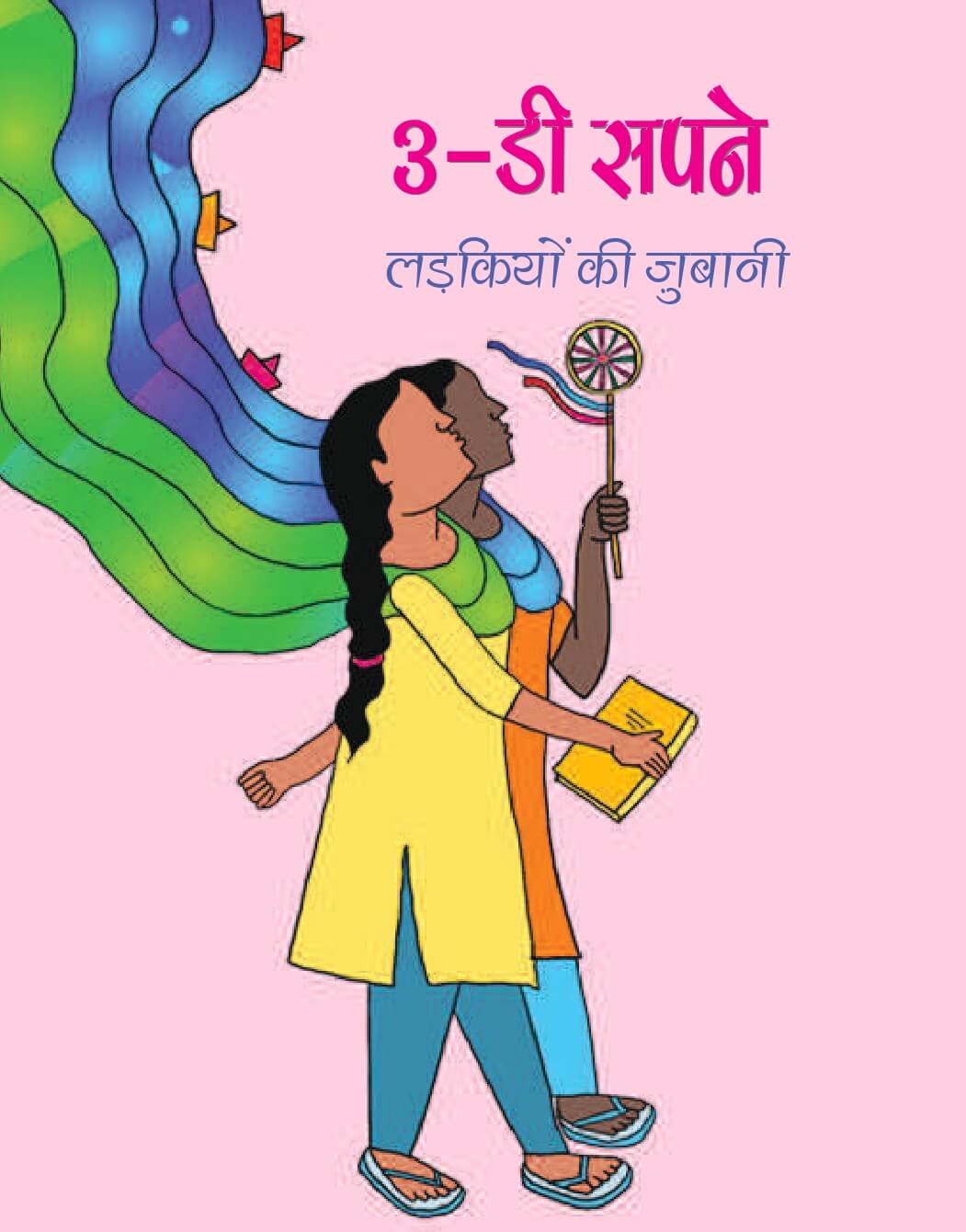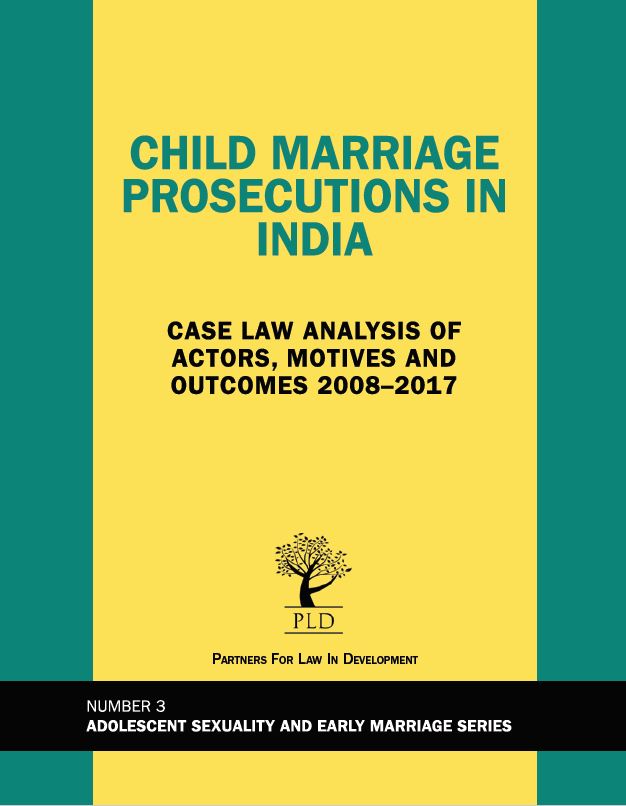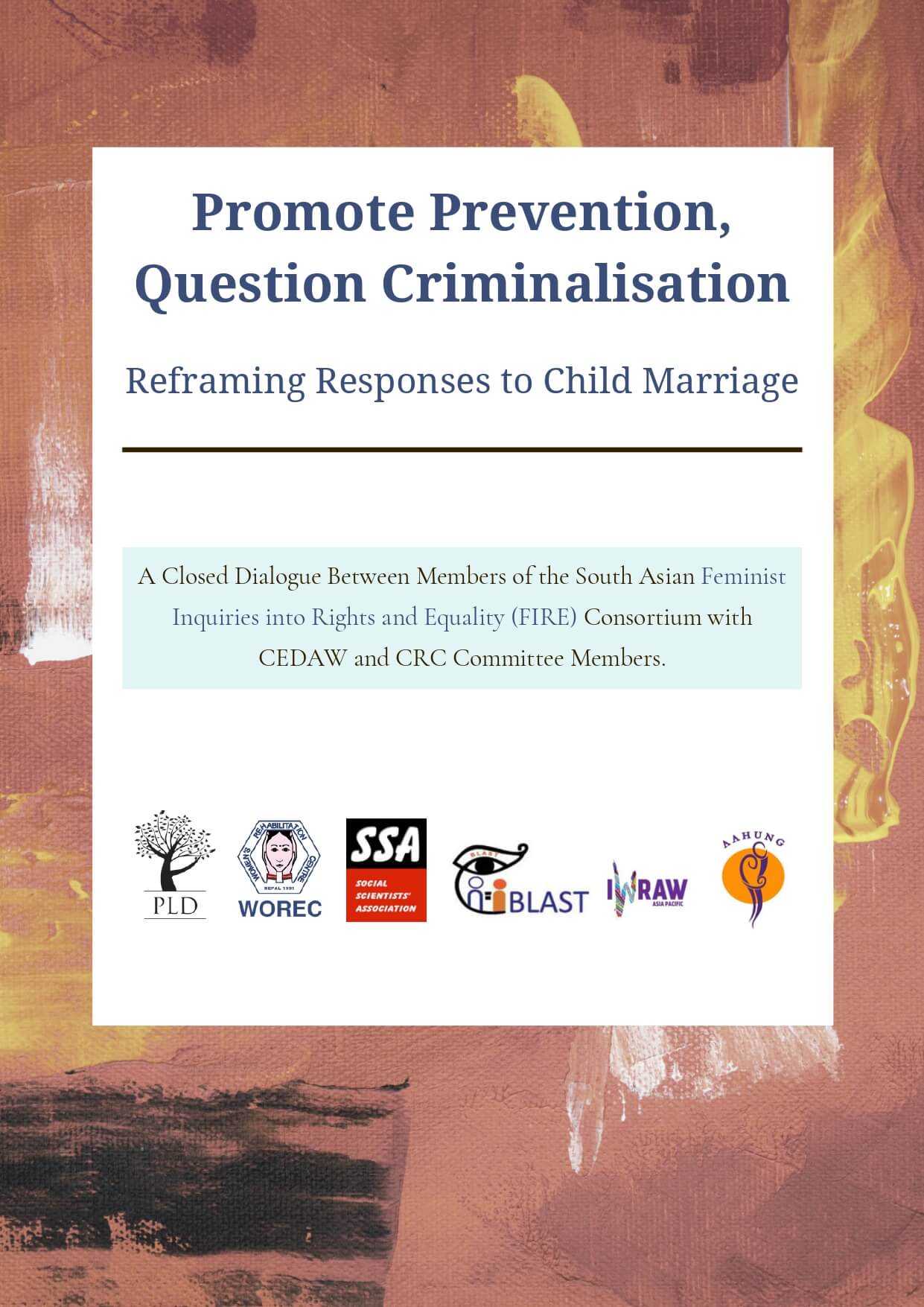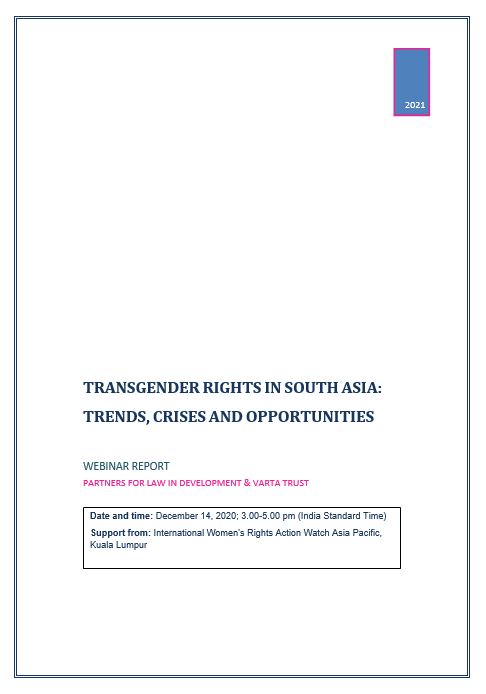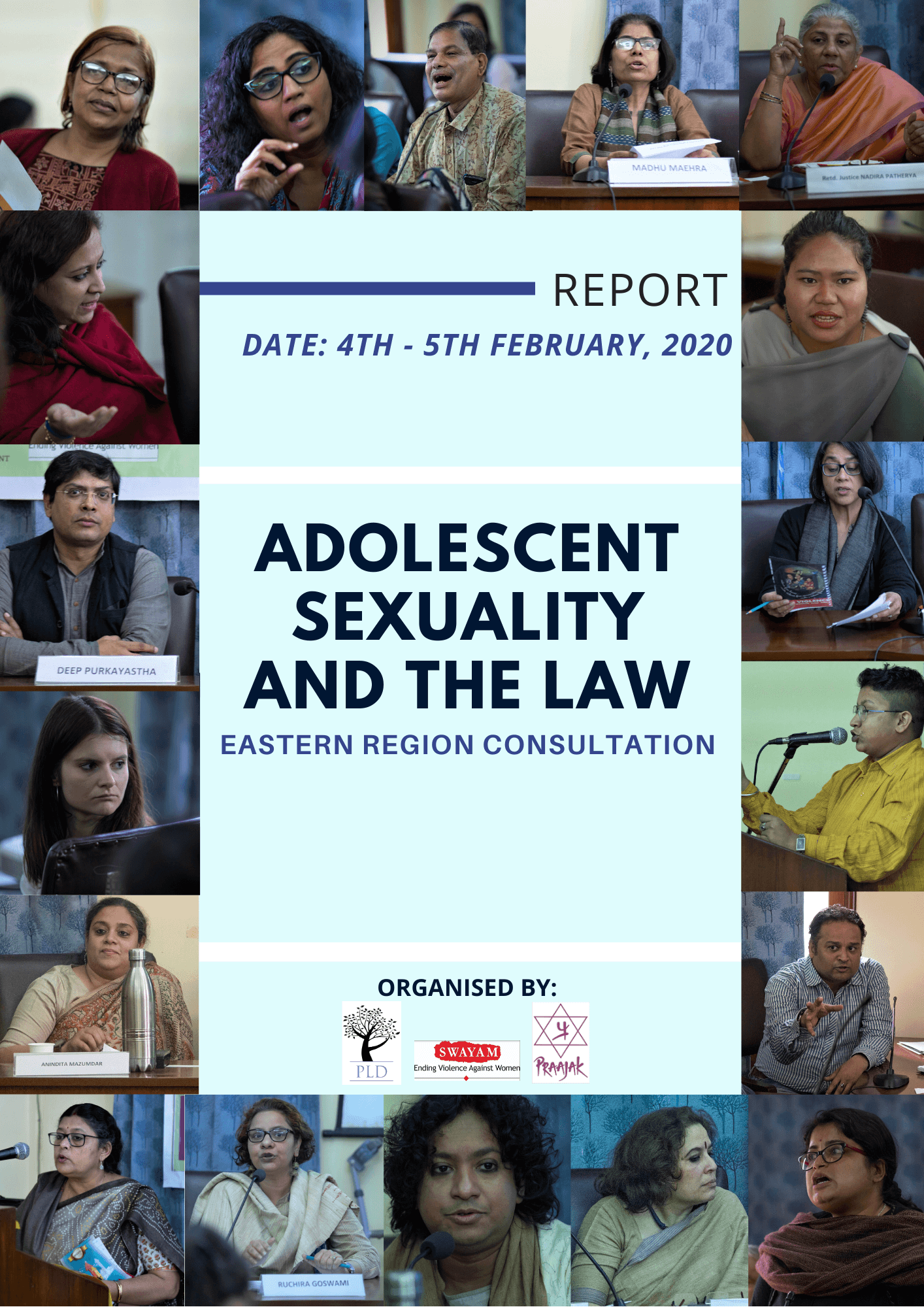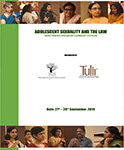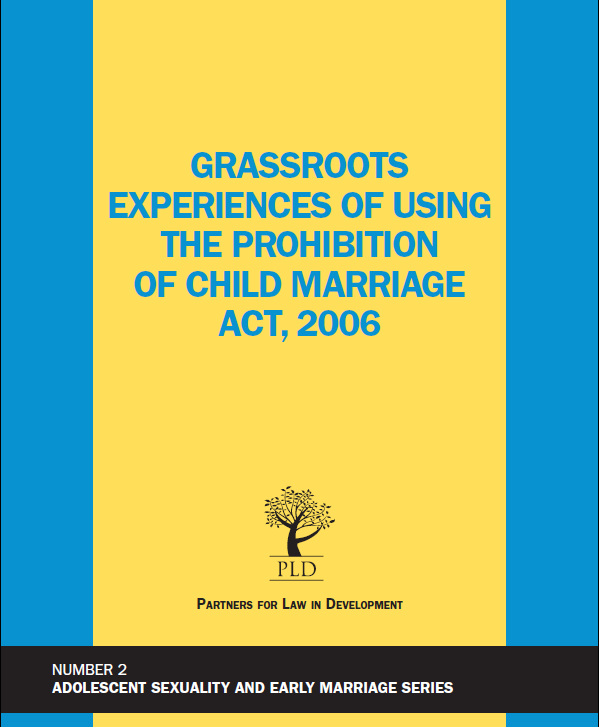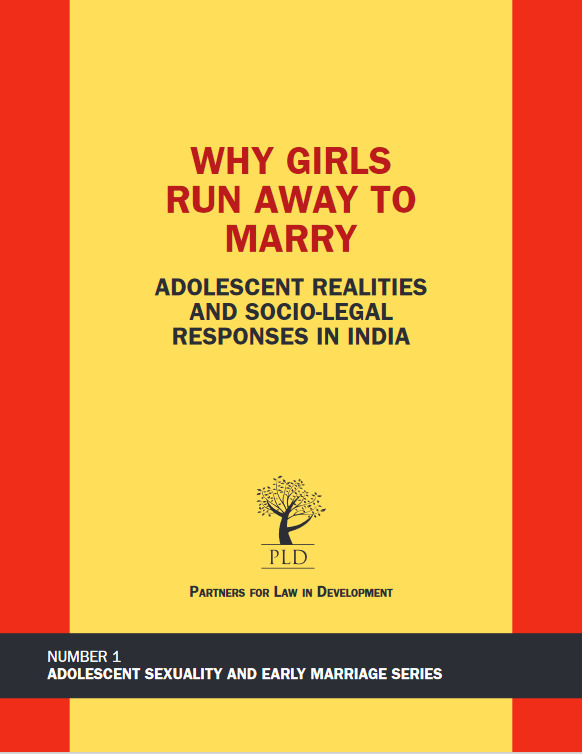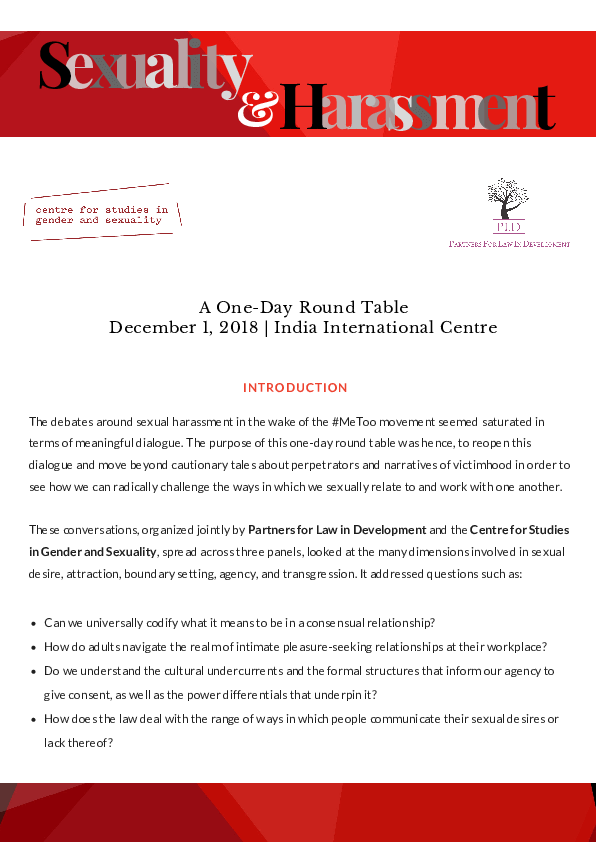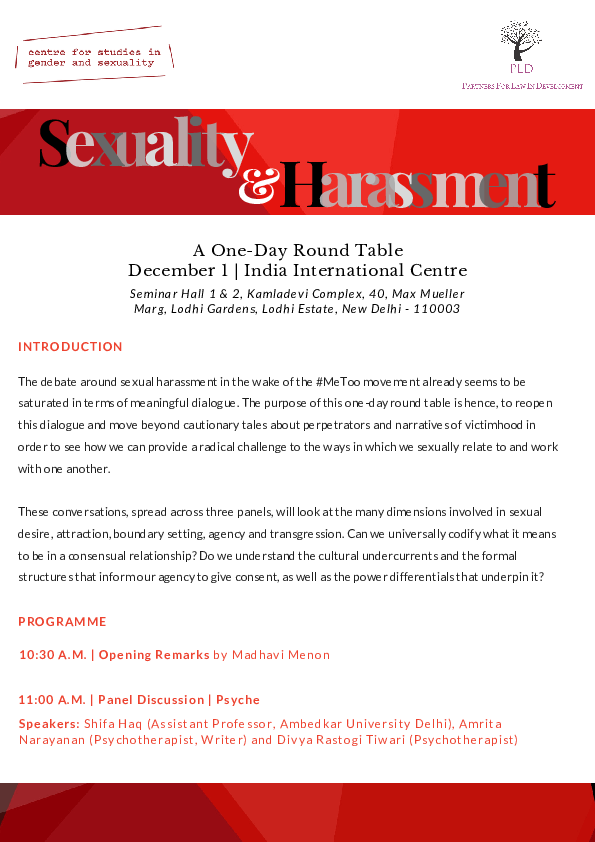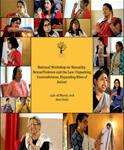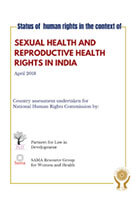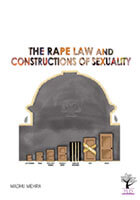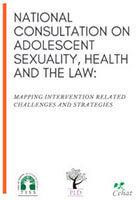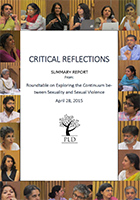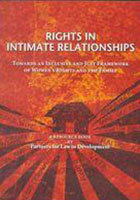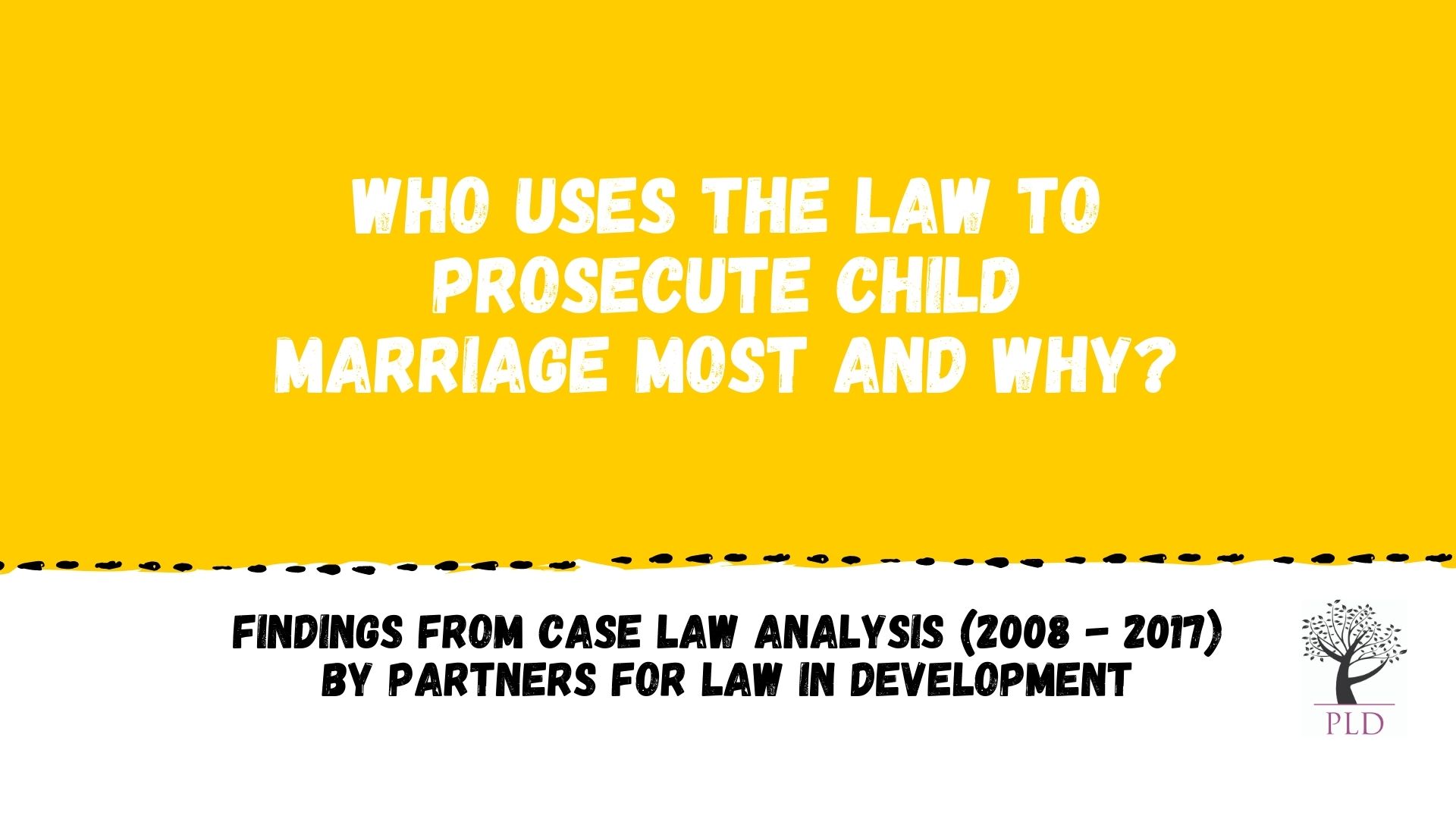Publications
Gender and Sexuality
The Adolescent Question-Feminist Co-Learning Journeys: A Report (2024)
In our report, we highlight the importance of feminist co-learning processes in addressing the unique needs of adolescents, a group often overlooked in discussions around rights and public health. We invite you to explore how centering adolescents can reshape our understanding and advocacy in various fields.
In our report, we highlight the importance of feminist co-learning processes in addressing the unique needs of adolescents, a group often overlooked in discussions around rights and public health. We invite you to explore how centering adolescents can reshape our understanding and advocacy in various fields.
3D Sapne: Ladkiyon Ki Zubaani: NCAAC’s First Digest of Essays written by Adolescent Girls (Hindi) 2022
A selection of the 40 most unique essays submitted by over 480 girls, between the ages of 15-25, residing in rural and urban-poor contexts across 12 states in India. These essays were submitted in response to the National Coalition Advocating for Adolescent (NCAAC)’s essay contest, “Mera Sapna” (My Dreams), inviting girls to address the essay to one of the three institutions from the family/ community/ state. The topic was conceptualised to help us draw insights about institutions that the girls viewed as playing a direct role in relation to fulfilling or obstructing their aspirations.
A selection of the 40 most unique essays submitted by over 480 girls, between the ages of 15-25, residing in rural and urban-poor contexts across 12 states in India. These essays were submitted in response to the National Coalition Advocating for Adolescent (NCAAC)’s essay contest, “Mera Sapna” (My Dreams), inviting girls to address the essay to one of the three institutions from the family/ community/ state. The topic was conceptualised to help us draw insights about institutions that the girls viewed as playing a direct role in relation to fulfilling or obstructing their aspirations.
Child Marriage Prosecutions in India – Case Law Analysis of Actors, Motives and Outcomes 2008-2017 (2021)
In the context of calls for no-exception stringent child marriage laws, both nationally and globally, this report offers first of its kind evidence, on how the law in its practice, aids power relations and social stigma within the Indian context. The study looks at district and High Court case law from 2008-2017, to evaluate whether in its usage, the law serves its intended purpose; and in its recommendations, draws on judicial principles that help minimise unintended harm of the law. In doing so, this study speaks to contemporary policy proposals relating underage marriage, and therefore is of significance.
In the context of calls for no-exception stringent child marriage laws, both nationally and globally, this report offers first of its kind evidence, on how the law in its practice, aids power relations and social stigma within the Indian context. The study looks at district and High Court case law from 2008-2017, to evaluate whether in its usage, the law serves its intended purpose; and in its recommendations, draws on judicial principles that help minimise unintended harm of the law. In doing so, this study speaks to contemporary policy proposals relating underage marriage, and therefore is of significance.
Promote Prevention, Question Criminalisation- Reframing Responses to Child Marriage (2020)
This report is an outcome of the country presentations from Bangladesh, India, Nepal, Pakistan and Sri Lanka made in a closed dialogue with committee members of the Convention on the Elimination of all Forms of Discrimination Against Women (CEDAW)/Convention on the Rights of the Child (CRC), including an overview of the common concerns that emerged from these country presentations.
This report is an outcome of the country presentations from Bangladesh, India, Nepal, Pakistan and Sri Lanka made in a closed dialogue with committee members of the Convention on the Elimination of all Forms of Discrimination Against Women (CEDAW)/Convention on the Rights of the Child (CRC), including an overview of the common concerns that emerged from these country presentations.
TRANSGENDER RIGHTS IN SOUTH ASIA: TRENDS, CRISES AND OPPORTUNITIES – WEBINAR REPORT
Report on webinar held on 14th Dec., 2020 by Partners for Law in Development (as part of the South Asian consortium Feminist Inquiries into Rights and Equality) and Varta Trust, on rights of transgender persons in South Asia featuring transgender activists and allies from Bangladesh, India, Nepal, Pakistan and Sri Lanka.
Report on webinar held on 14th Dec., 2020 by Partners for Law in Development (as part of the South Asian consortium Feminist Inquiries into Rights and Equality) and Varta Trust, on rights of transgender persons in South Asia featuring transgender activists and allies from Bangladesh, India, Nepal, Pakistan and Sri Lanka.
Eastern Region Consultation on Adolescent Sexuality and the Law (2020)
On 4th and 5th February 2020, a two-day Eastern Region Consultation on ‘Adolescent Sexuality and the Law’ was organized by Partners for Law in Development (PLD), Swayam and New Alipore Praajak Development Society (Praajak) in Kolkata. This meeting is a continuation of national level consultations held by PLD with CEHAT and RCI-VAW (TISS) in Mumbai (August 2017), PLD with AJWS in New Delhi (December 2018) and PLD with TULIR in Chennai (September 2019), to document grassroots experiences of working with the Prohibition of Child Marriage Act (PCMA) to help girls prevent/exit forced marriages; as well as PLD’s socio-legal studies on elopements by under-age girls; the use of Protection of Children from Sexual Offences Act (POCSO) and the PCMA in cases of consensual relations. Resource persons from sectors such as sexual and reproductive health, law, child abuse, and sexuality education participated in the consultation and shared their experiences and challenges faced while working with adolescents. The consultation was a means to consolidate experiences from different interventions into adolescents’ lives and see how to engage with stakeholders beyond the social sector, including the media and the State.
On 4th and 5th February 2020, a two-day Eastern Region Consultation on ‘Adolescent Sexuality and the Law’ was organized by Partners for Law in Development (PLD), Swayam and New Alipore Praajak Development Society (Praajak) in Kolkata. This meeting is a continuation of national level consultations held by PLD with CEHAT and RCI-VAW (TISS) in Mumbai (August 2017), PLD with AJWS in New Delhi (December 2018) and PLD with TULIR in Chennai (September 2019), to document grassroots experiences of working with the Prohibition of Child Marriage Act (PCMA) to help girls prevent/exit forced marriages; as well as PLD’s socio-legal studies on elopements by under-age girls; the use of Protection of Children from Sexual Offences Act (POCSO) and the PCMA in cases of consensual relations. Resource persons from sectors such as sexual and reproductive health, law, child abuse, and sexuality education participated in the consultation and shared their experiences and challenges faced while working with adolescents. The consultation was a means to consolidate experiences from different interventions into adolescents’ lives and see how to engage with stakeholders beyond the social sector, including the media and the State.
Southern Region Consultation on Adolescent Sexuality and the Law (2019)
Partners for Law in Development (PLD) in partnership with Tulir organized a two-day consultation to understand and discuss the criminalization of adolescent sexuality. This consultation sought to addressing particular the impact of laws and policies on adolescent sexuality, crisis intervention services, sexual and reproductive health and capacity development. Sixty participants representing individual practitioners as well as about 35 organizations working with adolescents across the domains of healthcare, education, sexuality and law came together to debate and discuss the specific opportunities and challenges presented by legal and state-driven interventions and mandates as well as the methods and avenues they used to navigate these structures.
Partners for Law in Development (PLD) in partnership with Tulir organized a two-day consultation to understand and discuss the criminalization of adolescent sexuality. This consultation sought to addressing particular the impact of laws and policies on adolescent sexuality, crisis intervention services, sexual and reproductive health and capacity development. Sixty participants representing individual practitioners as well as about 35 organizations working with adolescents across the domains of healthcare, education, sexuality and law came together to debate and discuss the specific opportunities and challenges presented by legal and state-driven interventions and mandates as well as the methods and avenues they used to navigate these structures.
Grassroots Experiences of Using The Prohibition of Child Marriage Act, 2006 (2019)
Based on case studies submitted by 25 organizations, this report aims to comprehend the grassroots experience of what “using the law” means for girls in a position of vulnerability for whom the law is intended, in order to provide them with security and claimant’s well-being. Should the attention be fixed on mounting legal sanctions, or focus on interventions to deal with root causes of such vulnerability?
Based on case studies submitted by 25 organizations, this report aims to comprehend the grassroots experience of what “using the law” means for girls in a position of vulnerability for whom the law is intended, in order to provide them with security and claimant’s well-being. Should the attention be fixed on mounting legal sanctions, or focus on interventions to deal with root causes of such vulnerability?
Why Girls Run away to Marry: Adolescent Realities and Socio Legal Responses in India (2019)
Based on stories of girls from three cities, this study introduces the issue of self-arranged marriages into the debate on child and early marriage in India. It provides qualitative insights into the contexts within which young relationships develop and are compelled into elopements, and to show how punitive legal responses cause harm on young lives.”The report is fascinating because it highlights some of the most crucial complexities that surround the issue of women’s freedoms…… it is heart-breaking to read of a 17-year-old girl sent to a remand home and a 19-year-old boy imprisoned merely for the ‘crime’ of sleeping together or running away to get married.”- Vaishna Roy, “How young is too young for consensual sex?”, The Hindu, 2019
Based on stories of girls from three cities, this study introduces the issue of self-arranged marriages into the debate on child and early marriage in India. It provides qualitative insights into the contexts within which young relationships develop and are compelled into elopements, and to show how punitive legal responses cause harm on young lives.”The report is fascinating because it highlights some of the most crucial complexities that surround the issue of women’s freedoms…… it is heart-breaking to read of a 17-year-old girl sent to a remand home and a 19-year-old boy imprisoned merely for the ‘crime’ of sleeping together or running away to get married.”- Vaishna Roy, “How young is too young for consensual sex?”, The Hindu, 2019
Sexuality and Harassment in the wake of the #MeToo movement: One-day Roundtable Report (2018)
This report has come out of a one-day round table on ‘Sexuality and Harassment in the wake of the #MeToo movement’, Partners for Law in Development held in collaboration with the Centre for Studies in Gender and Sexuality, Ashoka University on December 1, 2018 at the India International Centre. The purpose of this event was to reopen dialogue and move beyond cautionary tales about perpetrators and narratives of victimhood in order to see how we can radically challenge the ways in which we sexually relate to and work with one another. These conversations, spread across three panels, by speakers from the fields of education, psychotherapy, law, and civil society organisations, looked at the many dimensions involved in sexual desire, attraction, boundary setting, agency, and transgression.
This report has come out of a one-day round table on ‘Sexuality and Harassment in the wake of the #MeToo movement’, Partners for Law in Development held in collaboration with the Centre for Studies in Gender and Sexuality, Ashoka University on December 1, 2018 at the India International Centre. The purpose of this event was to reopen dialogue and move beyond cautionary tales about perpetrators and narratives of victimhood in order to see how we can radically challenge the ways in which we sexually relate to and work with one another. These conversations, spread across three panels, by speakers from the fields of education, psychotherapy, law, and civil society organisations, looked at the many dimensions involved in sexual desire, attraction, boundary setting, agency, and transgression.
Sexuality and Harassment in the wake of the #MeToo movement: One-day Roundtable Brochure (2018)
This is a brochure for a one-day round table on ‘Sexuality and Harassment in the wake of the #MeToo movement’, Partners for Law in Development (PLD) held in collaboration with the Centre for Studies in Gender and Sexuality, Ashoka University on December 1, 2018 at the India International Centre. The brochure provides information about the three panel discussions and speakers who discussed the many dimensions involved in sexual desire, attraction, boundary setting, agency, and transgression.
This is a brochure for a one-day round table on ‘Sexuality and Harassment in the wake of the #MeToo movement’, Partners for Law in Development (PLD) held in collaboration with the Centre for Studies in Gender and Sexuality, Ashoka University on December 1, 2018 at the India International Centre. The brochure provides information about the three panel discussions and speakers who discussed the many dimensions involved in sexual desire, attraction, boundary setting, agency, and transgression.
National Workshop on Sexuality, Sexual Violence and the Law (2018)
Partners for Law in Development (PLD) organised a National Workshop on Sexuality, Sexual Violence and the Law: Unpacking Contradictions, Expanding Sites of Action from 25th-28th March at Zorba the Buddha, New Delhi. This workshop sought to understand the inter-linkages of rape law with the other legal provisions on sexuality, as they relate to issues of power structures, gender relations and sexual autonomy along with looking at the origins of sexual offences, including rape – and the relationship of rape law with other penal offences on sexuality.This is part of a series of events by PLD, which seek to foreground the continuum between sexuality and sexual violence, by exploring inter-linkages and interdependence between the two.
Partners for Law in Development (PLD) organised a National Workshop on Sexuality, Sexual Violence and the Law: Unpacking Contradictions, Expanding Sites of Action from 25th-28th March at Zorba the Buddha, New Delhi. This workshop sought to understand the inter-linkages of rape law with the other legal provisions on sexuality, as they relate to issues of power structures, gender relations and sexual autonomy along with looking at the origins of sexual offences, including rape – and the relationship of rape law with other penal offences on sexuality.This is part of a series of events by PLD, which seek to foreground the continuum between sexuality and sexual violence, by exploring inter-linkages and interdependence between the two.
Country Assessment on Human Rights in the Context of Sexual Health and Reproductive Health Rights (2018)
This report is the first national inquiry on sexual and reproductive health undertaken by PLD and SAMA on behalf of the National Human Rights Commission. It maps critical concerns pertaining to sexual health and reproductive health as two distinct but partially overlapping concerns in the context of India. The distinct and separate elaboration of the two thematic domains have been dealt with in parts I and II of this report respectively. Sexual and reproductive health rights have been progressively enshrined under various international covenants and policy instruments. This accords sexual and reproductive health recognition within a right based framework and obligates the State to ensure their protection, promotion and fulfillment.
This report is the first national inquiry on sexual and reproductive health undertaken by PLD and SAMA on behalf of the National Human Rights Commission. It maps critical concerns pertaining to sexual health and reproductive health as two distinct but partially overlapping concerns in the context of India. The distinct and separate elaboration of the two thematic domains have been dealt with in parts I and II of this report respectively. Sexual and reproductive health rights have been progressively enshrined under various international covenants and policy instruments. This accords sexual and reproductive health recognition within a right based framework and obligates the State to ensure their protection, promotion and fulfillment.
The Rape Law and Constructions of Sexuality (2018)
This resource book explores the role of law in regulating female sexuality, by contextualizing the rape law within the broader socio-cultural understanding of gender and caste as sites of power and privilege. Written in simple language, it is intended to make accessible a critical understanding of sexuality as a site of power, state control, and political struggle for those sections of activists and change agents who have little or no access to such resources on the law. This resource book is designed to complement PLD’s trainings, while also being a stand-alone reading for students and social workers alike. It may also be of interest to those curious about feminist critiques of sexuality and the law.
This resource book explores the role of law in regulating female sexuality, by contextualizing the rape law within the broader socio-cultural understanding of gender and caste as sites of power and privilege. Written in simple language, it is intended to make accessible a critical understanding of sexuality as a site of power, state control, and political struggle for those sections of activists and change agents who have little or no access to such resources on the law. This resource book is designed to complement PLD’s trainings, while also being a stand-alone reading for students and social workers alike. It may also be of interest to those curious about feminist critiques of sexuality and the law.
National Consultation on Adolescent Sexuality, Health and the Law: Mapping Interventions (2017)
Partners for Law in Development in partnership with CEHAT and RCI-VAW, TISS organized a two day consultation to understand how policies and programmes relating to adolescents interact with each other to impact adolescents in self-arranged sexual relationships. 50 participants from 30 organizations working with adolescents across domains of health, education, sexuality and the law, came together to discuss the specificities of challenges and opportunities presented by laws and State programmes, and the approaches they adopt to navigate such challenges.
Partners for Law in Development in partnership with CEHAT and RCI-VAW, TISS organized a two day consultation to understand how policies and programmes relating to adolescents interact with each other to impact adolescents in self-arranged sexual relationships. 50 participants from 30 organizations working with adolescents across domains of health, education, sexuality and the law, came together to discuss the specificities of challenges and opportunities presented by laws and State programmes, and the approaches they adopt to navigate such challenges.
Critical Reflections: Exploring the Continuum between Sexuality and Sexual Violence (2015)
The four volumes are compilations of the rich, vibrant discussions from the Roundtable on Exploring the Continuum between Sexuality and Sexual Violence on April 28, 2015, representing each of the panels. ‘Critical Reflections‘ is our endeavour to share the nuanced perspectives that emerged from the roundtable with the larger movement, to initiate and sustain dialogue on protectionist frameworks arising from an exclusive focus on sexual violence, to the neglect of concerns of sexuality.
The four volumes are compilations of the rich, vibrant discussions from the Roundtable on Exploring the Continuum between Sexuality and Sexual Violence on April 28, 2015, representing each of the panels. ‘Critical Reflections‘ is our endeavour to share the nuanced perspectives that emerged from the roundtable with the larger movement, to initiate and sustain dialogue on protectionist frameworks arising from an exclusive focus on sexual violence, to the neglect of concerns of sexuality.
Rights in Intimate Relationships (2010)
The resource book ‘Rights in Intimate Relationships’ seeks to understand rights in intimate relationships within a framework that recognizes rights for all women regardless of their sexuality, marital status, or legality of relationship. In proposing a framework based on ‘intimate relationships’ it moves beyond the boundaries of the exclusivist, marriage centric framework of conjugality in the law. The resource book examines customary and contemporary non normative intimacies in rural and urban India from a feminist perspective, relies upon constitutional, comparative and human rights law, to explore a transformatory rights agenda in respect of the family.
The resource book ‘Rights in Intimate Relationships’ seeks to understand rights in intimate relationships within a framework that recognizes rights for all women regardless of their sexuality, marital status, or legality of relationship. In proposing a framework based on ‘intimate relationships’ it moves beyond the boundaries of the exclusivist, marriage centric framework of conjugality in the law. The resource book examines customary and contemporary non normative intimacies in rural and urban India from a feminist perspective, relies upon constitutional, comparative and human rights law, to explore a transformatory rights agenda in respect of the family.
An easy-to-follow guide to understand whether the Prohibition of Child Marriage Act, 2006 serves the purpose for which it was enacted supported by qualitative analysis carried out by PLD of case laws between 2008 to 2017.







